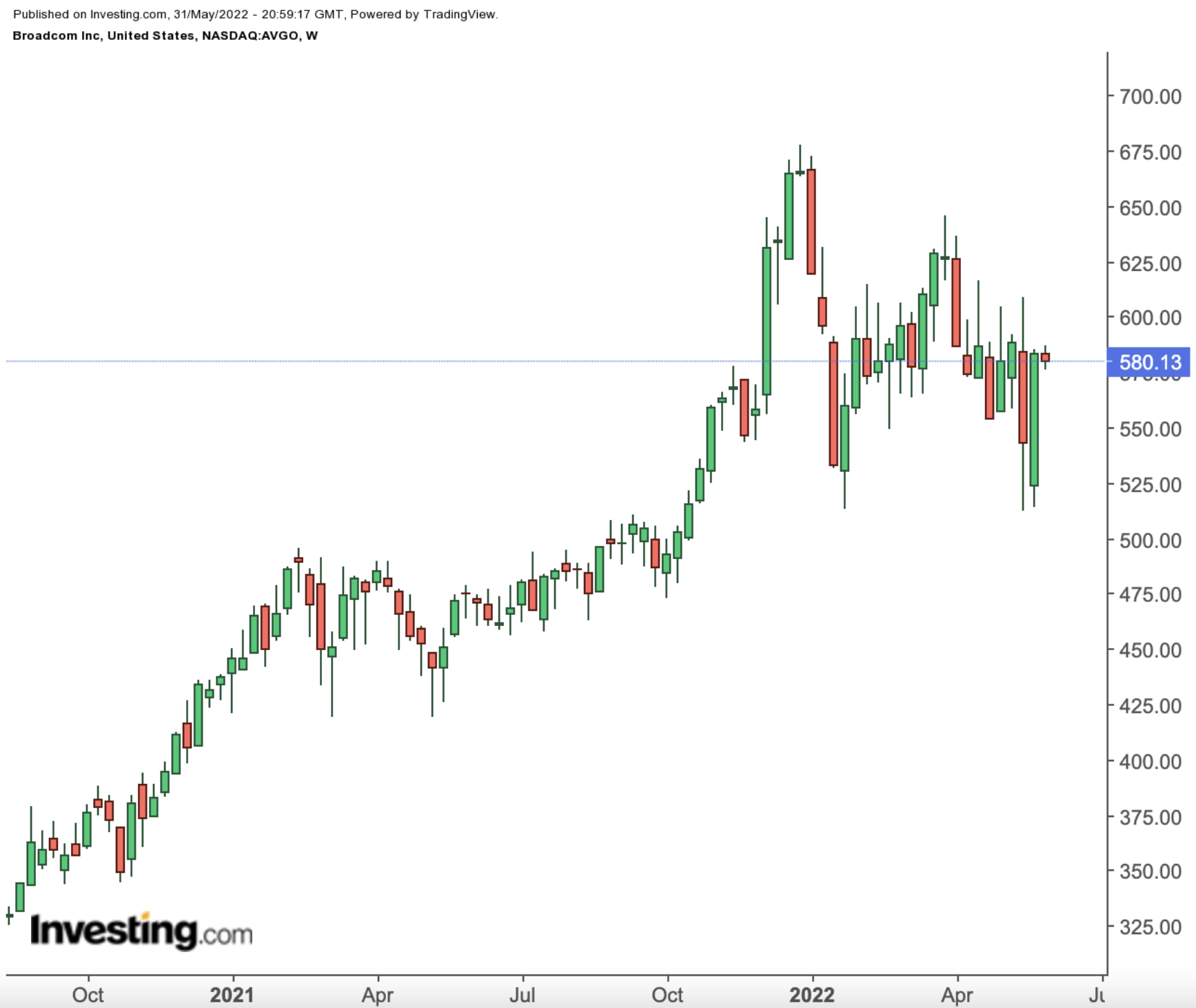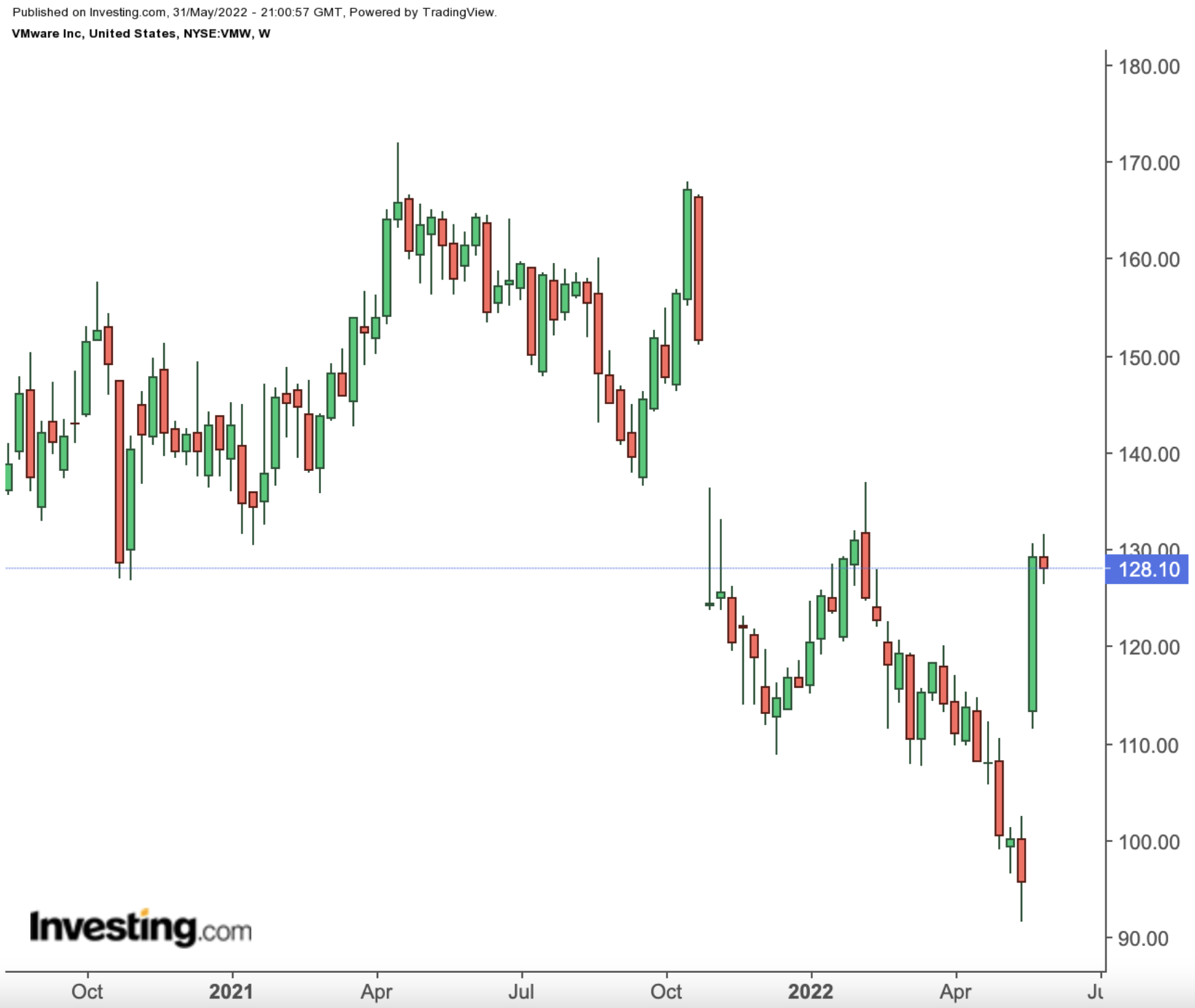- The VMware deal is the latest in Broadcom’s pursuit of growth through acquisitions
- Buying a software giant gives Broadcom more access to the fast-growing data-center market
- If the deal is successful, it would nearly triple the size of Broadcom’s software division
- If you’re interested in upgrading your search for new investing ideas, check out InvestingPro+
Chipmaker giant Broadcom (NASDAQ:AVGO) recently revealed its intentions to buy cloud computing and virtualization technology company VMware (NYSE:VMW) in a $61 billion deal—one of the largest technology M&As in history.
Shares of the San Jose, California-based company have gained 10.6% since the story first broke last week. The stock closed Tuesday at $580.13.

VMware stock, which similarly gained 10.4% since the announcement, closed Tuesday at $128.10 a share.

If successful, the deal would go down as the third-largest technology takeover in history, according to Fortune Magazine, only behind Microsoft’s (NASDAQ:MSFT) $68.7 billion gaming-giant Activision Blizzard (NASDAQ:ATVI) acquisition earlier this year and Dell’s (NYSE:DELL) $67 billion buy-out of cloud computing and storage company EMC, in 2015.
The move is Chief Executive Hock Tan’s biggest bet yet on enterprise software. Since the beginning of his realm, Tan has built Broadcom into a microchip powerhouse by acquiring makers of a host of undervalued companies, then cutting costs and leveraging the company’s growing growth pricing power.
In 2018, CEO Tan bought IT management software and solutions company CA Technologies for about $19 billion. A year later, he followed through with his M&A strategy by acquiring Symantec (NASDAQ:NLOK)'s enterprise security business for $10.7 billion in 2019.
A Strategic Move
In a call to analysts on Thursday, Tan said:
“VMware fits well with Broadcom’s strategy.”
He added that the company is an indispensable provider of mission-critical platform technology with a blue-chip customer base and an incredible innovation engine.
The VMware deal is part of a larger strategy designed to help Broadcom diversify away from its core business of designing and selling semiconductors into enterprise software—a market segment where margins are strong.
Buying the cloud computing and virtualization technology giant would give Broadcom deeper access to the fast-growing data-center market, nearly tripling the size of Broadcom’s software division and accounting for almost 49% of the company’s revenue.
Broadcom makes a wide range of electronic products used in various industries, from iPhones to industrial equipment, while VMware makes virtual software that allows users to access systems remotely. The companies currently don’t have overlapping products; however, many data centers have used their products simultaneously.
Wider Margins, Consistent Sales
Some analysts favor the deal, which they believe makes strategic sense. Wells Fargo analysts wrote in a note last week:
“Investors have been increasingly focused on Broadcom’s appetite for another strategic or platform enterprise software acquisition -- especially given the recent compression in software valuation.”
The note further adds:
“An acquisition of VMware would be considered as making strategic sense; consistent with Broadcom’s focus on building out a deepening enterprise infrastructure software strategy.”
In its latest analysis, Bloomberg said that buying VMware will let Broadcom tap into markets that generally carry wider profit margins and a more regular flow of sales, avoiding the volatility of the chip sector. If Broadcom completes the VMware deal, it will bring the company’s business model to a 50-50 semiconductor-to-software mix, said Bloomberg Intelligence analyst Woo Jin Ho.
While Broadcom stock soared more than 120% in the past five years, its dividend also swelled. It has grown more than four times, from $1.02 per share each quarter in 2017 to $4.08. Broadcom’s extensive reach to multiple industries also gives investors both a reliable income stream and added upside potential.
According to a recent note by Goldman Sachs, Broadcom’s strong margins should be even more attractive to investors in this environment, as they look for companies that have room for error in managing costs. The note said:
“Management’s intense focus on differentiation and leadership shows in the company’s gross margin. Broadcom generates the highest gross margins within our coverage universe. Still, it has also done so over the years with little variability, despite the cyclicality inherent to the semiconductor industry.”
Bottom Line
Broadcom’s aggressive entry into the software market makes its stock more attractive for long-term investors. The company’s careful approach to dealing with the future demand shocks, combined with its dividend income, makes it a good pick for risk-averse investors.
In addition, Broadcom is a growth stock that pays a consistent dividend, currently $4.10 quarterly for an annual yield of 2.83%.
***
The current market makes it harder than ever to make the right decisions. Think about the challenges:
- Inflation
- Geopolitical turmoil
- Disruptive technologies
- Interest rate hikes
To handle them, you need good data, effective tools to sort through the data, and insights into what it all means. You need to take emotion out of investing and focus on the fundamentals.
For that, there’s InvestingPro+, with all the professional data and tools you need to make better investing decisions. Learn More »
